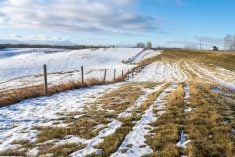Saskatchewan has named the first 10 pastures that will be transferred from the federal government to the province to patrons by 2014.
They are: Estevan-Cambria, Excel, Fairview, Ituna-Bon Accord, Keywest, Lone Tree, McCraney, Newcombe, Park and Wolverine.
Patrons will have the opportunity to either buy or lease the pastures, said agriculture minister Lyle Stewart.
The first 10 of 60 pastures were selected based on patrons’ interest, proposals received and consultation with the patron advisory committee chairs, the government said.
The federal and provincial governments are working on a memorandum of understanding that will see federal staff continue to manage the 10 pastures through 2013 as the patrons plan for the takeover.
Read Also

Federal budget draws mixed reaction from Canadian agriculture groups
The 2025 federal budget took a step forward in recognizing agriculture’s importance but failed to address pressing challenges like labour disruptions, interswitching and precision technology, say Canadian farm groups.
Saskatchewan Stock Growers Association president Harold Martens said the organization welcomed the ability for patrons to either buy or lease the pastures. This gives individual patron groups greater financial flexibility, he said.
“The SSGA has been pleased to provide input to the government to ensure that the transfer process to patron management goes as smoothly as possible,” Martens said in a news release.
Martens was a member of the advisory committee to Stewart that recommended the patrons be given that flexibility. The committee also said each pasture should remain as a complete block, sales should be based on market value and any sale of native prairie should be subject to no-break and no-drain conservation easements.















